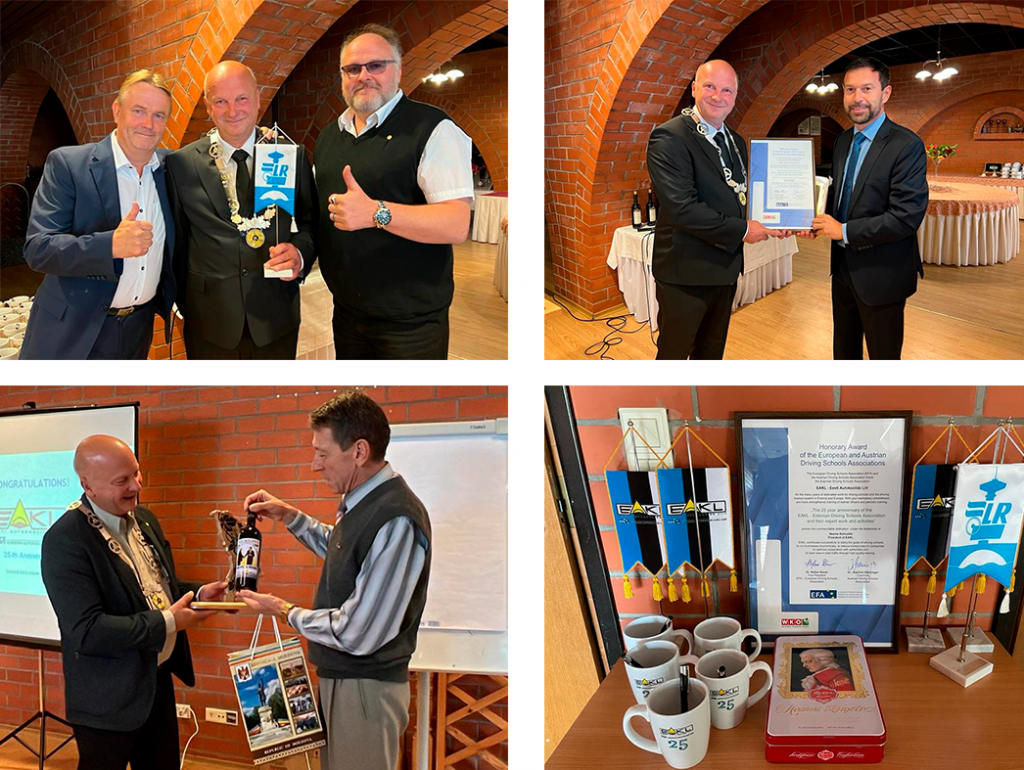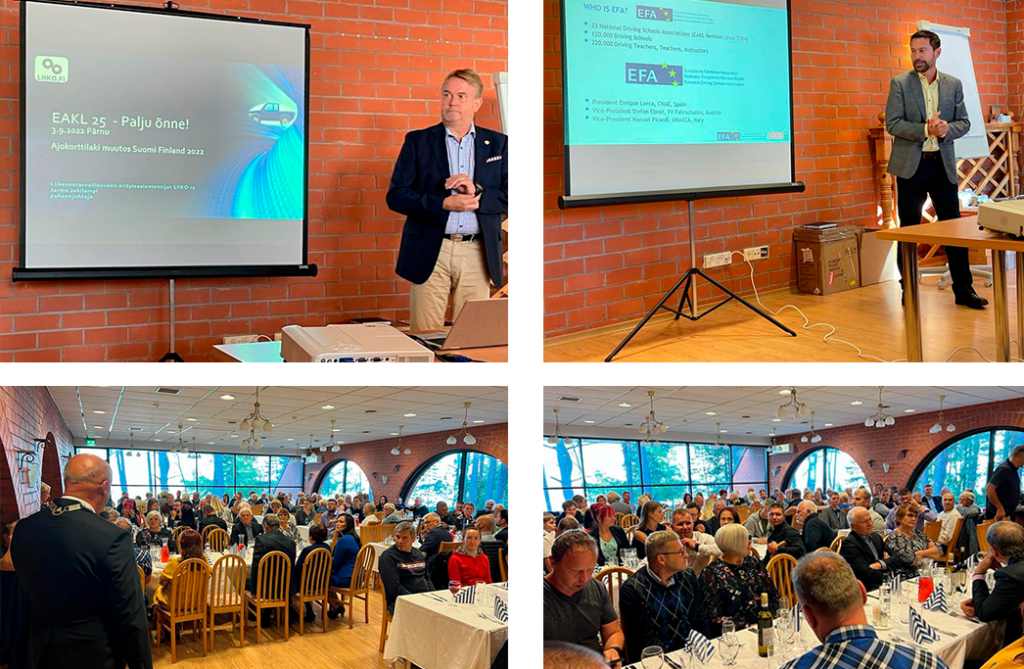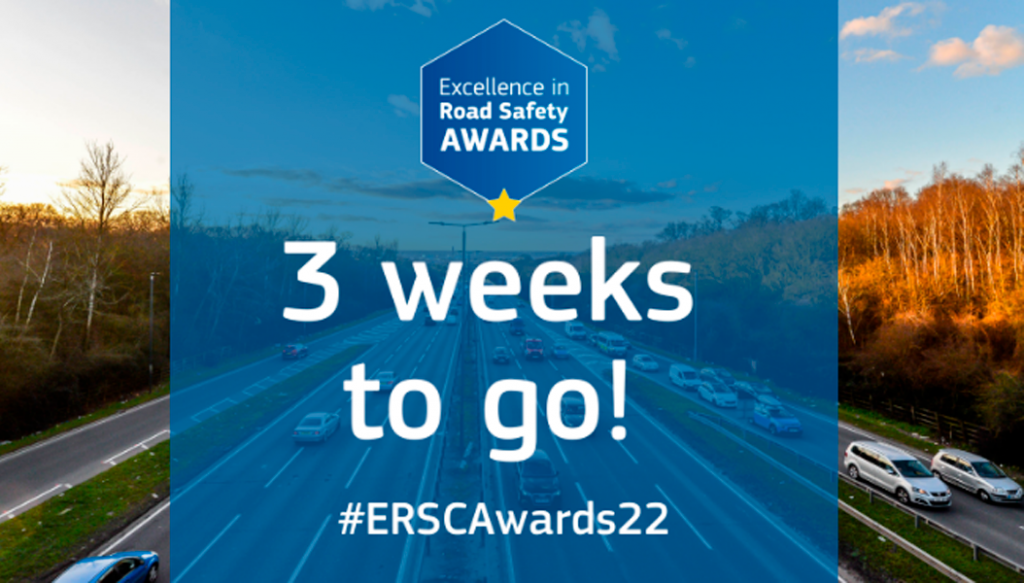Estonian Driving Schools General Assembly

The 25th anniversary of the Estonian Driving School Association EAKL was held on 2nd and 3rd September. The event was characterized by the participation of a large number of experts: owners of driving schools and Estonian driving teachers. The focus of the event was technology: the right behavior in increasingly technological traffic, which passes through an intelligent infrastructure, such as intelligent pedestrian crossings and new traffic rules. Dr. Stefan Ebner, EFA Vice President, gave an introductory speech, thanking the Estonian Association of Driving Schools EAKL Eesti Autokoolide Liit and its President Neeme Kylmallik for their active commitment in road safety and the driving school sector.
In Estonia, 15,000 driving licenses are issued per year for a population of around 1.3 million. Tests take place in 15 locations by the Transport authority. The aim is to reduce the long waiting times for an exam, which currently run up to three months, and to develop a driving school inspectorate with the appropriate skills.
The issue of automatic restriction (code 78) is also a topic on the agenda for the Estonian association.
European driving schools are at the starting blocks to convert their fleets into electric cars and automatic vehicles. The regulations of the EU driving license directive should therefore be amended in order to achieve clarity and a uniform procedure soon. Driving schools in Estonia also want an early solution to facilitate the elimination of the so-called code 78 entry in the driver’s license, which limits the authorization to drive to automatic vehicles (no vehicles with manual transmission), according to the result of discussions from working groups carried out at the EAKL driving school association.

Sein 25jähriges Jubiläum feierte der Estnischen Fahrschulverband Verband EAKL am 2. und 3. September. Die Festveranstaltung fand großen Zuspruch bei den Betreibern von Fahrschulen und Fahrlehrern ab. Inhaltliche Schwerpunkte waren unter anderem das richtige Verkehrsverhalten in einem zunehmend technikfokussierten Verkehr, der intelligente Verkehrsinfrastrukturen wie smarte Fußgängerübergänge passiert und die Auslegung neuer Verkehrsregeln. Dr. Stefan Ebner Vizepräsident des Europäischen Fahrschulverbandes EFA hielt eine Keynote-Ansprache und dankte dem estnischen Fahrschlverband EAKL Eesti Autokoolide Liit und seinem Obmann Neeme Kylmallik für das aktive Mitwirken an der Verkehrssicherheit und dem Fahrschulwesen.
In Estland werden jährlich 15000 Führerscheine erworben. Die Bevölkerung beträgt 1,3 Millionen. Prüfungen finden an 15 Standorten bei der Transportbehörde statt. Schwerpunkte sind die Verkürzung der langen Wartzeiten auf eine Prüfung von derzeit bis zu drei Monaten und der Aufbau einer mit entsprechenden Kompetenzen ausgestatteten Fahrschulinspektion.
Lösung zur Automatikbeschränkung Code 78 steht ebenfalls auf der Agende der estnischen FahrschulenDie Fahrschulen Europas stehen in den Startlöchern, um ihre Fuhrparks auf E-Autos und Automatikfahrzeuge umzustellen. Die Vorschriften der EU-Führerschein-Richtlinie sollten daher rasch umgestellt werden, um bald Klarheit und eine einheitliche Vorgehensweise zu erzielen. Auch die Fahrschulen Estlands wollen eine baldige Lösung für eine Erleichterung bei der Streichung des sogenannten Code 78 Eintrags in den Führerschein, der die Lenkberechtigung auf Automatikfahrzeuge einschränkt (ohne Fahrzeugt mit Schaltgetriebe), so das Ergebnis von Fachgesprächen beim Fahrschulverband EAKL.
EFA at WP1 – AAMVA publication

AAMVA and EFA present the document Digital Driving Permits, during the Global Forum for Road Traffic Safety (WP.1) held on 20th September 2022 at the UNECE in Geneva. AAMVA and EFA offer an overview of digital driving licences, including its functionality and the problems it solves.
ETSC – Reducing Child Deaths on European Roads (PIN Flash 43)

Every day in the European Union, more than eighteen children are seriously injured and one is killed in road traffic collisions. More than 6000 have died over the last decade.
The impact of these deaths and life-changing injuries on families and communities is immeasurable. But they also carry an economic cost, which diverts resources that could have been used for education, improving health or other social goods.
Children are particularly vulnerable road users. They lack experience and are less visible to other road users due to their small stature. Children are also often unaware of the risks they take unintentionally, and more easily become innocent victims in collisions. Read more and download the report at here.
MAIN RESULTS OF MOVING SURVEYS COMPARING FACE TO FACE LEARNING TO E-LEARNING

MOVING International Road Safety Association is very concerned about the impact of digital media on driving learning processes. For that purpose, MOVING conducted several representative surveys in early 2022 and gathered insights from the driving school market in Germany (driving instructors and learner drivers) on the preferences and effective training of learner drivers in comparison between face-to-face instruction and e- learning. Read the statements of the president MOVING Jörg-Michael Satz and the survey on the German driving schools.
ERSC – Excellence in Road Safety Awards 2022

Our Excellence in Road Safety Awards ceremony will provide an opportunity to support and celebrate the leading road safety initiatives from across Europe – we hope you can join us!
Our ceremony will be a hybrid event taking place on Monday 17 October 2022 15:00 – 18:00 CET in Brussels and online.
Registration to attend in person has now closed however, we still have spaces to attend online. If you have registered to attend in person then a separate confirmation will be provided: here.
FITDRIVE EVENT – Burgos

On 7th September the 2nd meeting of the project financed by the European Commission Fitdrive was held in Burgos at the ITCL headquarters. The line to follow during the project was drawn and tasks were assigned to the various partners. EFA will begin with information gathering among its partners and in collaboration with EPDA, The European Professional Drivers Association. In a second phase EFA will recruit trucks drivers up to 3.5 tons (lorries) to organize the pilot courses foreseen by the subsequent tasks of the project. Read more about the project on
Decarbonising Europe’s Trucks: How to Minimise Cost Uncertainty

Trucks account for one-fifth of transport sector emissions in Europe. To decarbonise, heavy-duty road freight must switch to zero-emission vehicles quickly. This report examines whether battery electric vehicles, electric road systems and hydrogen fuel cell vehicles could compete with diesel-driven vehicles. It looks at the total cost of ownership across nine different vehicle-size segments in Europe. The report gives six recommendations to accelerate the transition to zero-emission trucks, including the provision of necessary infrastructure.
Prevention of driving under the influence of alcohol

In 2001, the European Commission adopted Recommendation (2001/115/EC) on the maximum blood alcohol concentration (BAC). Today, most Member States have adopted legislation fixing maximum BAC limits in accordance with it. The measures aimed at tackling the problem of driving under the influence of alcohol or other psychoactive substances belong to the domain of driver behaviour, which remains in the remit of Member States competences. Nevertheless, almost twenty years after the recommendation was adopted, driving under the influence of alcohol remains one of the most common accident factors.







